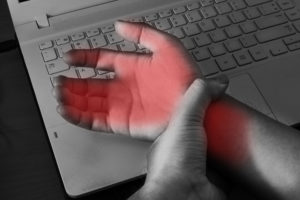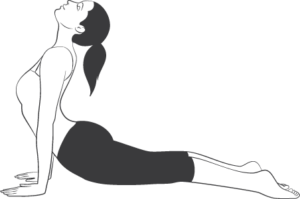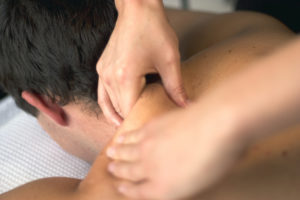Have you ever bashed yourself in the elbow and hit your “funny bone”?
The pain travels all the way up the ulnar nerve and can cause pain up to your arm, making it hard to bend your elbow, and even sometimes causing muscle weakness.
Everyone overextends themselves sometimes, and this can ultimately lead to a pinched nerve, which can feel like a knot under the skin that can be painful causing tingling numbness.
Common Places Your Nerves Can Get Pinched
The most common types of pinched nerves are the result of repetitive moment.

Arthritis, carpal tunnel syndrome, and strained neck muscles caused by a hunched desk jockey posture are common causes. The ulnar nerve we’ve already mentioned is often pinched just by leaning over and resting your elbows on your office desk (or the steering wheel).
Sciatica is another type of a pinched nerve, which usually impacts the spine, and travels all the way down your back legs. It can make walking very painful and is usually caused by lifting, or by bad posture.
You can even experience a pinched nerve in pregnancy when your enlarging uterus can cause compression in the sensory nerve leading up to the upper thigh.
How To Treat A Pinched Nerve
The best way to treat a pinched nerve is to give it some rest. However, because of the way nerve pain travels, it’s tough to tell precisely where the pain is radiating from, or what you should be treating.
These 7 tried and true “do-it-yourself” tips can help you get back to feeling like yourself again.
How To Treat A Pinched Nerve – Tip #1: Rest

It can be tough to simply treat a pinched nerve in the wrist with rest.
You’ve got a busy schedule ahead, and if you spend long hours in the office, chances are you’re going to irritate the same nerves all over again.
Using a brace to hold your arms or hands in place to avoid irritating the nerve further can help.
Take a few days off with a brace, and you’re sure to see an improvement.
How To Treat A Pinched Nerve – Tip #2: Heat and Cold Packs
Heat and cold packs are inexpensive treatments for muscle strain and pinched nerve.
The combination of hot and cold can increase the circulation of fresh blood. That helps you heal faster, as well as relieving the pain.
Holding an ice pack over the infected area for about 15 minutes a few times a day means you reduce swelling and inflammation, which will avoid compressing an already pinched nerve.
How To Treat A Pinched Nerve – Tip #3: Change Your Posture

They say that posture says a lot about someone. But above and beyond appearances, your bad posture can cause sciatica or other nerve damage.
Straighten your back and take the pressure off your shoulders and elbows by sitting up straight, and using cushions and neck rests when possible.
If you have to spend hours at a desk at work, try for an ergonomic workstation, such as a standing workstation, chairs with lumbar support, and adjusting the height of your monitor to avoid straining your neck or hunching your shoulders.
How To Treat A Pinched Nerve – Tip #4: Get A Massage
Nerve damage is caused by stress and strain to particular muscles sitting too close to nerves.
Alleviate some of that pressure by getting regular massages. Seeking out a professional deep tissue massage can soften the tight knots and deactivate the trigger points that are impinging the underlying nerves.
If you can’t afford or don’t have time for regular therapeutic messages, an at-home mini massager can help you get the treatment you need. They can be used with a partner, or even by yourself, depending on where the injury is.
How To Treat A Pinched Nerve – Tip #5: Try Yoga

Yoga focuses on increased flexibility, correcting your posture, and relaxing your tense muscles. It’s the perfect exercise to try as a treatment for a pinched nerve.
Increased mobility in joints and muscles means you’re less likely to strain something, and better posture and more mobility means taking the pressure off of compressed nerves and muscles.
Try learning some basic stretches and yoga poses. There are simple stretches that can help you with most pinched nerve problems. And you don’t need to look into physiotherapy to perform them at home!
How To Treat A Pinched Nerve – Tip #6: Pain Medication and Physiotherapy

Sometimes, at-home treatments don’t make a dent in taking care of your pinched nerve problem.
Over the counter pain, medication like ibuprofen is designed to relax muscles. Your doctor may prescribe physical therapy and mild pain relief if you received a pinched nerve due to an injury or ongoing illness.
If you are finding that over-the-counter medication isn’t helping, it may be time to talk to your doctor. In these cases, a pinched nerve might be a signal for something more serious. Corticosteroids are one option to treat the inflammation caused by a pinched nerve, to give it time to heal.
How To Treat A Pinched Nerve – Tip #7: Time To Make Some Lifestyle Changes

As you can see, there are plenty of ways to treat a pinched nerve at home, and most doctors agree that resting the nerves is the best way to keep your body healthy.
If you’re finding yourself frequently getting pinched nerves, then this probably indicates a more complex health issue, like chronic pain, or loss of mobility, carpel tunnel, arthritis, and sciatica.
In these cases, it might be time to make some lifestyle changes. Weight loss has been shown to decrease the pain in pinched nerves, thanks to reduced pressure on the joints.
Also, low impact aerobic exercise such as swimming, cycling or yoga can keep your joints flexible, and muscles more supple.
You might not think a pinched nerve is anything to be concerned about. However, prolonged pressure on a nerve, if left untreated, can lead to severe nerve damage.
Pay attention to your body. Practice better posture, and be sure to rest when you feel pain, even when you’re not sure what caused the injury. Resting up, practicing some stretches, and a few at-home massages should give you back full mobility, and making a few lifestyle changes can help prevent it from happening again.



